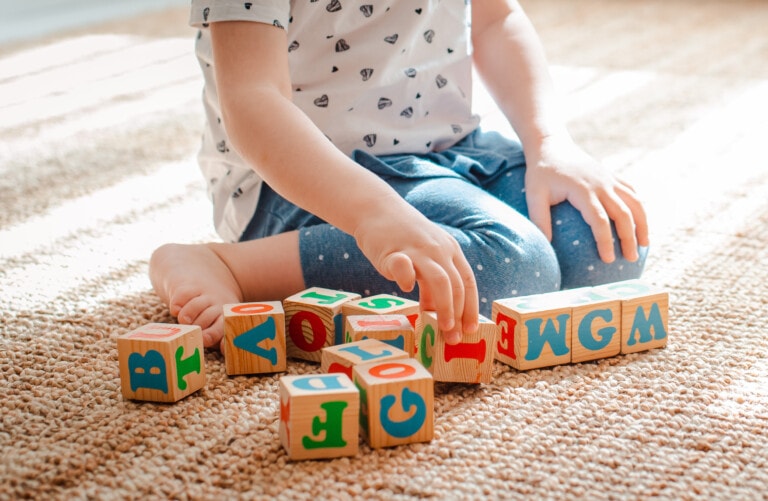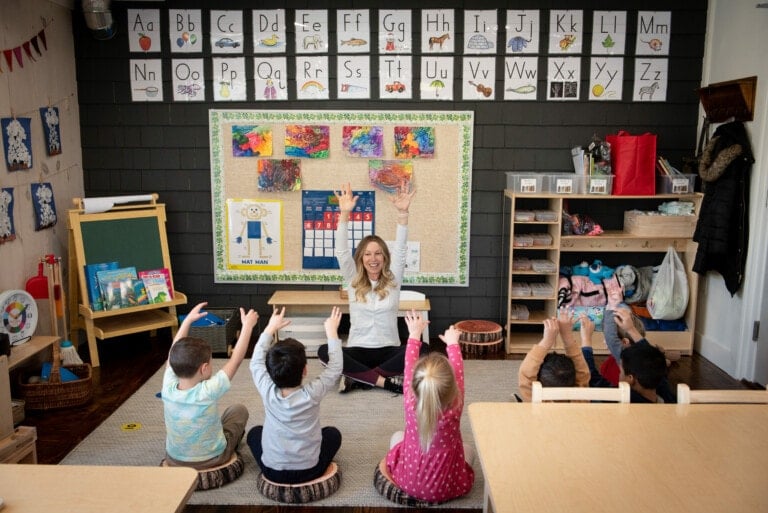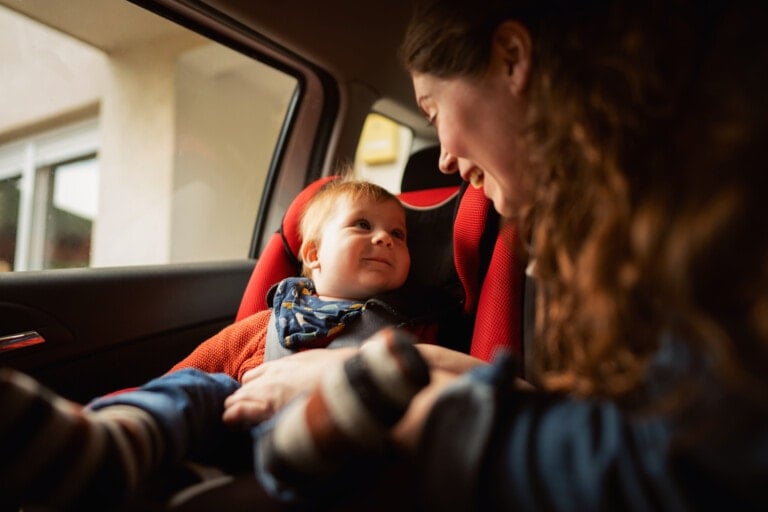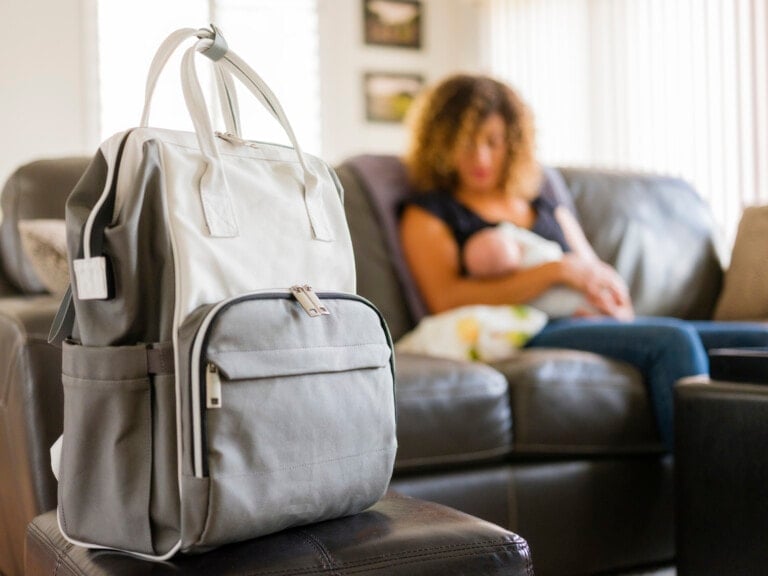Deciding when and where to start your baby at daycare is a big decision. These choices can affect you, your baby, your family, and your career. Your baby has been with you for nine months in the womb, your entire maternity leave, and possibly even longer. So parting with them often comes with mixed emotions, like sadness, a sense of freedom and productivity, and relief of reuniting.
Sometimes the motivation to find a daycare for your baby comes from feeling desperate for some alone time. Or perhaps you feel stretched too thin trying to keep up with your job full-time while littles constantly crawl at your feet. Is your patience or productivity suffering? Maybe the desire to start daycare for your baby stems from wanting the experience for your child. The socialization, the learning, and the activities at daycare are often more than one parent can do at home. Studies show superior psychosocial, language, motor, and cognitive development and even healthier weights among children in daycare.1
Trusting someone else to care for your child can be incredibly difficult regardless of your reasoning for looking into your daycare options. Having the facts and options laid out before you can make the process and the decision-making a little easier.
Daycare: When Your Baby Can Start and How to Prepare
At What Age Can a Baby Start Daycare?
Many daycare centers start accepting infants as young as six weeks old. If you must return to work after a six-week maternity leave, you may not have any other option than to start your newborn in daycare. However, if you don’t have to go back to work or are looking into daycare for other reasons, there are things to consider to delay daycare or starting as soon as possible.
Delaying Starting Daycare
If possible, it may be better to wait a bit longer to start your baby in daycare. This gives your infant’s immature immune system a chance to develop. Studies show a rapid increase in colds at the start of daycare, then a relatively fast decline with continued daycare. Delaying these first colds can help prevent fevers and more severe infections and conditions in newborns. Children who start daycare earlier and spend more time in daycare are also more likely to develop respiratory tract disorders and allergies.2,3
Starting Daycare Early
Conversely, if you start daycare early for your baby, they will get to know their daycare providers from such a young age that they may feel more comfortable with them. Separation anxiety typically begins sometime between six and nine months of age. If your baby learns the drop-off routine and is familiar with their caregivers before this milestone, the early transition to daycare may be more manageable. Another benefit to starting daycare at a young age is the correlation with advanced academic achievement even into high school.4,5
When Should You Start Looking for a Daycare?
If you are considering enrolling your baby in daycare, it is time to start researching your local options. Certain daycare centers are so competitive and in demand in some areas that they are among the first to know of a woman’s pregnancy. This way, that baby has a spot in daycare when they are ready. Some daycares have waitlists months or even a year long. Other daycares, such as those affiliated with schools, only enroll new children at certain times of the year, so it is good to reserve a spot starting in the year that you will need care.
In short, you can start looking at daycares now! Learning about different types and touring some options will give you direction and help you narrow down what you are looking for. If a specific daycare you are interested in tells you that you are too early, at least you will have an idea of a better timeframe to reach out to them.
Choosing a Daycare
These days, daycares are not “one size fits all.” There are many types and sizes of daycares to choose from. Here’s a rundown of the kinds you can look into.
Home Daycare
Home-based daycare providers care for children in their homes or other residential settings. Lots of parents like the familial feel that home daycares provide. Home daycares can be good for families with multiple children of different ages because siblings are not separated in different classrooms. Home daycares may also offer more flexibility on hours and days of the week.
Home daycares typically care for a limited number of infants and toddlers. Licensing requirements vary by state, and they govern health and safety requirements. Licensed home daycares are inspected and audited regularly, but not all home daycares are licensed.
Daycare Centers
Daycare centers are larger settings in commercial buildings. They have a more extensive staff of care providers overseen by a director. Some parents feel reassured that there are many adults in the building. Children are usually separated into smaller classes by age group. Daycare centers typically have a school-like structure with many age-appropriate activities and equipment.
Many centers are licensed, but licensing requirements vary by state. Some programs, such as faith-based daycares, summer camps, and daycares operated by schools, may not require licensure. Licensed programs are monitored to ensure they follow specific regulations and health and safety requirements. You can look up any programs you are considering to determine if they are licensed.
Parent’s Day Out
Mom’s Day Out or Parent’s Day Out is a type of childcare usually located in a church or faith community. It offers daycare for limited hours, both shorter days and fewer days of the week. This may be a good fit for parents who work part-time, work from home, or have flexible hours. Many stay-at-home parents also use these programs to introduce daycare or school settings and get some things done around the house! Parent’s Day Out programs are not usually licensed, but many still reference state guidelines for health and safety.
Important Considerations for Choosing the Right Daycare
There are many considerations when choosing which daycare best fits your family. When identifying the right one, it can be overwhelming to think about all the characteristics to prioritize. Here is a list of some of the most important things to consider:
Daycare Facility Specifics
- Schedule and hours—Compare the daycare’s schedule to your work schedule. Who will be doing drop-off and pick-up? Does that match up with your work hours? Add half an hour at each end of your workday to allot time for drop-off and pick-up.
- Location—Also, evaluate the daycare’s location in relation to your home and office. You may prefer a daycare close to where you work. But if that is far from your partner’s work or your home, you may get stuck doing drop-off and pick-up every day. Sometimes a location close to your home or a more centralized location may be more convenient.
- Age span—What is the age range of children the daycare accepts? This affects how long your child will be able to stay at the same daycare and whether any siblings can attend the same daycare. Also, consider age cutoffs per classroom, how long your child may be with the same primary caregiver in the same center or whether they will be in a classroom with their siblings.
- Additional services—What additional services does the center provide? For instance, some locations serve lunch and snacks, while others require that you pack them for your child. Some families may prefer not to worry about packing food, while other parents want more control over what their child is eating.
Other Important Factors to Consider
- Ensure that background checks are completed on all adults living, working, or volunteering in the childcare setting.
- Confirm that all providers are trained in CPR, safe sleep, child development, and medication administration, if applicable.
- There should be an adult-to-child ratio of two or three infants per adult and a maximum group size of six to eight babies in a room.
- Ask whether the daycare assigns a primary caregiver to your baby to encourage attachment, trust, and comfort.
- Look for a low staff turnover rate so your baby can nurture a relationship with a primary caregiver and does not feel abandoned.
- Learn how the daycare will communicate with parents regarding sleep, diapering, eating, and activities. Some daycares use phone apps, text messages, or even video streaming. Be sure to ask if you will receive updates throughout the day or a report at the end of the day. Frequent and detailed communication from daycare shows that they see your relationship as a collaborative effort for the baby.
- When touring daycare centers in person, remember that more physical activity among daycare providers is correlated with increased physical activity among children. Keep your eye out for care providers who are active and on their feet.
- Observe the room where your baby will spend their time. Look for a clean, comfortable, welcoming, and cozy environment with age-appropriate toys and ample floor space to crawl.
Financial Considerations
Childcare makes up the most significant portion of their budget for many families, often even more than housing, food, and sometimes even college tuition. There are many types of programs to help pay for daycare. Here are some common options:6
Government Assistance
The federal government provides money to states to go toward childcare for low-income families so they can work or attend school. The government also offers Head Start daycare programs at no cost to low-income families. You may also be eligible for a tax credit for daycare if you meet certain requirements.6,7
Employer Assistance
Some companies or universities, and colleges offer onsite childcare. This is sometimes discounted for employees or students. Your employer may offer assistance to help pay for daycare, so be sure to consult your benefits consultant if applicable. You may also be able to set aside a certain number of pretax dollars from your paycheck to go toward your daycare bill.6
Scholarships
Specific daycares may offer scholarships or tuition assistance. You may also be able to find local scholarship opportunities for daycare. Finally, some childcare centers offer sibling discounts if you enroll multiple children.
How to Prepare to Start Daycare
It takes time for any baby to learn a new routine and new people. Starting daycare is also an adjustment for you as you grow accustomed to being away from your baby more than you may ever have been. Your child may be resistant to naps or feeds when they start daycare. This may cause increased moodiness during the transition, even at home. Ultimately, children learn the difference between home and daycare and adapt to the different settings. Emotional drop-offs will get easier, naps and feedings will become more regular, and your baby may even get excited to see their friends at daycare.
Preparing Your Baby
No matter how prepared you and your baby are, there will be an adjustment period. But getting things ready in advance can help ease the transition to starting daycare. Here are some tips on how to prepare your baby.
- Try to get your baby used to people other than you. Leave them with a grandparent, aunt or uncle, or even just your partner. Expose your baby to being with other trusted caregivers for brief periods ahead of the daycare transition.
- Talk about what is coming up positively. You may not think your baby can understand you, but they can certainly pick up on your mood. For instance, on our way to daycare, I talk to my daughter about the activities she might do at “school” that day and the friends she might see.
- Read books about going to school or daycare. Check out your local library for this content.
- Practice your routine. Preview the daycare a day or two before their first day so it is familiar and fresh in their minds. Stay with your baby during your tour or visit day.
- Send your child with a keepsake or reminder of you and home. This could be a “lovey,” a photograph, or a favorite book.
- At drop-off, keep transitions short to avoid prolonging the distress of watching you leave. Have a goodbye ritual, and be consistent. The longer you make it, the more challenging the transition can be for your child.
- Give the care provider tips on what your baby likes, such as specific feeding positions, ways they want to be held, or songs that soothe them.
Preparing What to Bring
Each daycare differs in what they provide and what they expect the family to bring, but below is a list of some items you may need to bring on the first day or daily.
- Diapers and wipes
- Diaper cream
- Any medications your baby takes
- Spare clothes
- Sleep items (sheets, sleep sack)
- Bottles, milk, food, snacks
- Outerwear such as hat, mittens, snowsuit
- Comfort items like pacifiers or a lovey
Managing Your Emotions About Daycare
When dropping off your baby at daycare, you may feel many emotions. My little one has been in daycare for almost a year, and I still cry at drop-offs sometimes. On other days I feel relief to have a bit of a break from her. Toddlers keep you busy! You are your baby’s home and the whole world, so it is normal to feel sadness and possibly guilt at drop-off. Feeling excited about returning to work or regaining freedom during the day is also normal.
To prepare for all the feelings you may experience, one thing you can try is planning a special day with your baby before starting daycare. Do all the activities you love together, and try to cherish that time. Also, be candid with your child’s daycare and caregiver about your feelings. Share with them if you are feeling sad or nervous. They have been through this transition with many other families and may be able to help you cope or give suggestions. They may also have more compassion and share more daily updates or photos.
All the preparation in the world cannot perfectly prepare you for the first day. When deciding for your family, try to take it one day at a time and allow yourself to feel the positive and negative feelings without guilt. Your time with your baby becomes even more special when it seems more limited. You will always be your baby’s parent, no matter how many other caregivers they have. Eventually, you may grow to enjoy the collaboration with your baby’s daycare. Lean on friends (especially those with kids in daycare!), family, and your partner for support during an emotional transition. I promise it gets easier, and you will find your new normal.





























